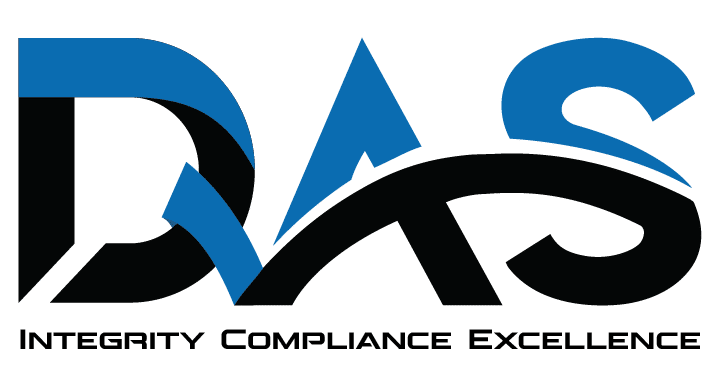- info@dascert.com
- 092 334 0567567
- Home
- About Us
- Services
- Certification
- ESG Certification
- ISO 45001 OHSMS
- ISO 9001 Quality Certification
- ISO 22000:2018 FSMS
- ISO 14001:2015 EMS
- ISO 27001:2022 ISMS
- ISO/TS 16949:2016 Automotive
- ISO 20000-1:2018 IT Services
- FSSC 22000 V6
- 5S, 6S, 7S Certification
- ISO 22301:2019 BCMS
- Halal Food Certification
- ISO 50001:2018 Energy Management Systems
- CE Marking
- ISO 31000:2018 Risk Management
- ISO 13485:2016 Medical Devices-QMS
- ISO 21001:2018 EOMS
- ISO 37001:2016 ABMS
- HACCP Certification
- ISO 27701:2019 Privacy Management Systems
- ISO 42001:2023 Artificial Intelligence Management System
- ISO 28000 Supply Chain Security Management
- Training
- ISO 45001-OHSMS CQI IRCA
- ISO 14001:2015 EMS, CQI-IRCA
- ISO 22000:2018 FSMS-CQI-IRCA
- ISO 9001:2015 QMS-CQI-IRCA
- FSSC 22000 V 6.0-CQI-IRCA
- ISO 27001:2022 ISMS-CQI-IRCA
- NEBOSH-IGC
- HABC Highfield Awarding Body
- Mobile Crane Operator Training
- Forklift Operator Training
- Scaffold Training
- Safe Use & Inspection of Rigging Gear
- Overhead Crane Training
- Riggers Training
- Inspection
- Lifting Equipments
- Lifting Gears / Accessories
- Elevators
- Earth Moving Equipment Inspections
- Inspection of Amusement Rides
- Racks Inspection
- Vehicles Emissions & Noise Testing
- Pre-Shipment Inspections
- Textile & Textile Products Inspection
- Oil Storage Tanks & Oil Carrying Tankers Inspection
- Tankers Inspection
- NDT Inspection
- Food Inspections, GMP Audits
- Weighing Bridges (Weighbridges) Inspection & Certification
- Production Monitoring / FR Inspection
- Technical Project Study / Installation Inspection
- Calibration
- Certification
- Accreditation
- DAS Accreditation
- Accredited under ISO 17020 as 3rd Party Inspection body
- Accredited under ISO 17021 as 3rd Party Certification Body
- Registered and approved by PSQCA as Inspection Company.
- Approved Training Partner of NEBOSH UK for IGC
- Approved Training Partner of HABC Highfields UK
- Accredited by LEEA UK as full member
- Providing Accredited Certifications
- Providing GFSI approved schemes certifications of FSSC 22000 and BRCG through SMG Inc.
- Contact
- Login
- Open Hours: Mon - Fri 08:00am - 05:00pm (PKT)
- info@dascert.com
- Home
- About Us
- Services
- Certification
- ESG Certification
- ISO 45001 OHSMS
- ISO 9001 Quality Certification
- ISO 22000:2018 FSMS
- ISO 14001:2015 EMS
- ISO 27001:2022 ISMS
- ISO/TS 16949:2016 Automotive
- ISO 20000-1:2018 IT Services
- FSSC 22000 V6
- 5S, 6S, 7S Certification
- ISO 22301:2019 BCMS
- Halal Food Certification
- ISO 50001:2018 Energy Management Systems
- CE Marking
- ISO 31000:2018 Risk Management
- ISO 13485:2016 Medical Devices-QMS
- ISO 21001:2018 EOMS
- ISO 37001:2016 ABMS
- HACCP Certification
- ISO 27701:2019 Privacy Management Systems
- ISO 42001:2023 Artificial Intelligence Management System
- ISO 28000 Supply Chain Security Management
- Training
- ISO 45001-OHSMS CQI IRCA
- ISO 14001:2015 EMS, CQI-IRCA
- ISO 22000:2018 FSMS-CQI-IRCA
- ISO 9001:2015 QMS-CQI-IRCA
- FSSC 22000 V 6.0-CQI-IRCA
- ISO 27001:2022 ISMS-CQI-IRCA
- NEBOSH-IGC
- HABC Highfield Awarding Body
- Mobile Crane Operator Training
- Forklift Operator Training
- Scaffold Training
- Safe Use & Inspection of Rigging Gear
- Overhead Crane Training
- Riggers Training
- Inspection
- Lifting Equipments
- Lifting Gears / Accessories
- Elevators
- Earth Moving Equipment Inspections
- Inspection of Amusement Rides
- Racks Inspection
- Vehicles Emissions & Noise Testing
- Pre-Shipment Inspections
- Textile & Textile Products Inspection
- Oil Storage Tanks & Oil Carrying Tankers Inspection
- Tankers Inspection
- NDT Inspection
- Food Inspections, GMP Audits
- Weighing Bridges (Weighbridges) Inspection & Certification
- Production Monitoring / FR Inspection
- Technical Project Study / Installation Inspection
- Calibration
- Certification
- Accreditation
- DAS Accreditation
- Accredited under ISO 17020 as 3rd Party Inspection body
- Accredited under ISO 17021 as 3rd Party Certification Body
- Registered and approved by PSQCA as Inspection Company.
- Approved Training Partner of NEBOSH UK for IGC
- Approved Training Partner of HABC Highfields UK
- Accredited by LEEA UK as full member
- Providing Accredited Certifications
- Providing GFSI approved schemes certifications of FSSC 22000 and BRCG through SMG Inc.
- Contact
- Login
Environmental Monitoring & Climate Change
Environmental Monitoring & Climate Change
Environmental Monitoring is the systematic collection of data on air, water, soil, noise, and other environmental parameters to assess the quality and trends in the environment. It helps identify pollution sources, monitor regulatory compliance, and assess the effectiveness of environmental protection measures.
Climate Change refers to long-term shifts in temperatures and weather patterns, largely driven by human activities like burning fossil fuels, deforestation, and industrial emissions. It is causing global issues such as rising sea levels, extreme weather events, loss of biodiversity, and resource scarcity.



What Needs to Be Done
To tackle environmental degradation and climate change, the following steps are crucial:
- Monitoring & Assessment: Regularly monitor environmental indicators (air, water, waste, emissions).
- Regulatory Compliance: Follow national and international environmental laws and standards.
- Sustainability Policies: Implement green policies and reduce carbon footprints.
- Renewable Energy Use: Transition to cleaner energy sources (solar, wind, hydropower).
- Waste Management: Promote recycling, hazardous waste control, and pollution prevention.
- Awareness & Training: Educate industries and communities on environmental responsibilities.
- Third-Party Auditing: Conduct environmental audits to identify gaps and corrective actions.
Globally recognized third-party Certification, Inspection, Training, and Calibration body committed to enabling businesses to achieve excellence, compliance, and competitiveness in the global marketplace.DAS plays a pivotal role in enhancing the operational performance, regulatory compliance, and market credibility of organizations.
What DAS Certification Can Provide
DAS Certification (Private) Limited can assist industries and organizations with a comprehensive suite of services to address environmental and climate change concerns:
Third-Party Certification Services
- ISO 14001:2015 – Environmental Management Systems
- ISO 50001 – Energy Management Systems
- ISO 14064 – Greenhouse Gas Emissions Verification
- ISO 14046 – Water Footprint
- Carbon Footprint & Sustainability Certifications
Environmental Audits & Inspections
- Compliance audits with local/international standards
- Waste management and pollution control audits
- Environmental Risk Assessments (ERA)
Environmental Monitoring Services
- Monitoring of air, water, soil, noise, and emissions
- Calibration of monitoring equipment
- Real-time environmental data reporting and analytics
Training & Awareness Programs
- ISO 14001 & ISO 50001 internal auditor and awareness training
- Climate change adaptation and mitigation workshops
- Sustainable development goals (SDGs) training
Consultancy & Advisory
- EMS system development and implementation
- Legal register development and compliance guidance
- Carbon neutrality and net-zero roadmap planning
Current Environmental Issues Around the World
- Global Warming – Due to greenhouse gas emissions.
- Air and Water Pollution – From industry, agriculture, and urbanization.
- Deforestation & Biodiversity Loss – Driven by land use and development.
- Waste Management Crisis – Hazardous and non-biodegradable waste.
- Ocean Acidification & Plastic Pollution
- Climate-induced Disasters – Droughts, floods, heatwaves.
- Overuse of Natural Resources
Benefits of Environmental Compliance Assurance
- Regulatory Compliance: Avoid penalties and legal actions.
- Improved Environmental Performance: Reduction in pollution and waste.
- Cost Efficiency: Resource and energy savings through optimized processes.
- Market Access & Reputation: Gain trust from customers and investors.
- Risk Mitigation: Identify and control environmental risks early.
- Support for Sustainability Goals: Contribute to SDGs and CSR commitments.
- License to Operate: Ensures continued operations in sensitive environments.
Conclusion
Environmental monitoring and climate change mitigation are no longer optional—they are essential. Organizations must act responsibly by implementing structured Environmental Management Systems and complying with global standards. DAS Certification empowers businesses through its auditing, inspection, training, and consultancy services to meet environmental challenges, drive sustainability, and ensure a greener future.





